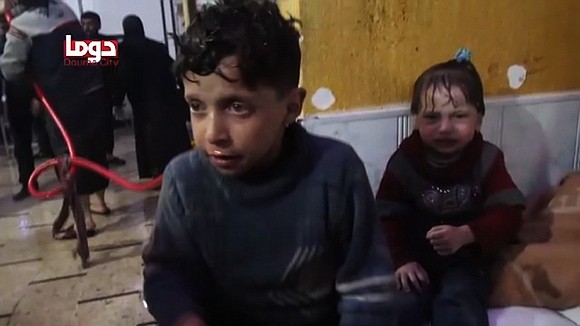US allies warn of action on suspected Syria chemical attack
CNN/Stylemagazine.com Newswire | 4/10/2018, 8:47 a.m.

By Sheena McKenzie, Tamara Qiblawi and Saskya Vandoorne, CNN
(CNN) -- US allies have rallied behind President Donald Trump's warning that Syria would pay a "big price" if it is found to have carried out a chemical attack on the rebel-held town of Douma.
France on Tuesday became the latest US ally to warn of action if Syria "crossed a red line" in Saturday's suspected chemical attack. According to activist groups, helicopters dropped barrel bombs filled with toxic gas on the town situated on the outskirts of the capital Damascus, killing dozens of civilians and wounding scores more.
French President Emmanuel Macron is expected to discuss the situation with Trump in the next 48 hours, government spokesman Benjamin Griveax told Europe 1 radio Tuesday.
France has previously warned it would respond with strikes on Syrian government forces, if evidence of chemical attacks was found.
British Prime Minister Theresa May, who has called the alleged attack "barbaric," is also set to discuss the situation with Trump on Monday, a Downing Street spokesperson told CNN.
But Russia has warned of severe repercussions in the face of western military intervention in Syria.
The Syrian government and Russia vehemently deny involvement and accuse rebel groups of fabricating the attack claims to hinder the army's advances and provoke international military intervention.
The alleged attack came as Syrian forces were on the verge of reclaiming Douma, the last town held by rebels in Eastern Ghouta, an area east of Damascus which has been besieged for six years and the focus of a renewed government offensive launched in mid-February.
Russian Foreign Minister Sergey Lavrov said Monday that his country had sent experts to Douma and that there was "no trace" of the use of chemical weapons used there.
During a tense United Nations Security Council meeting on Monday, Russia's UN envoy asked the Organization for the Prohibition of Chemical Weapons (OPCW) to fly to Syria immediately and begin investigations in Douma on Tuesday morning.
The OPCW confirmed Monday it planned to send a fact-finding mission to Douma, but declined to reveal a timetable.
United Nations Secretary General Antonio Guterres said in a statement Tuesday that he fully supported the OPCW fact-finding mission and urged all parties involved in Douma to grant experts unrestricted access.
US, Russia exchange war of words
The Russian Ambassador to the United Nations, Vassily Nebenzia, traded barbs with US Ambassador Nikki Haley at a Security Council meeting on Monday, saying a US military response could have "grave repercussions."
"Russia is being unpardonably threatened," Nebenzia told the meeting. "The tone with which this is being done is going beyond the threshold of what is acceptable, even during the Cold War."
Haley said Russia, the strongest ally of Syrian President Bashar al-Assad, was "covered in the blood of Syrian children."
"History will record this as the moment when the Security Council either discharged its duty or demonstrated its utter and complete failure to protect the people of Syria," Haley said. "Either way, the United States will respond."
The clock is now ticking on a US response to the attack, after Trump said on Monday that the US would act in 24 to 48 hours.
In a series of blistering tweets on Sunday, Trump warned Russia, Iran and Syria of a "big price to pay" following the attack, slamming Syrian President Bashar al-Assad as an "animal."
He was joined by other world leaders in condemning the suspected attack, including Turkish Turkish President Recep Tayyip Erdogan, who earlier this year launched a military offensive against Kurdish groups in Afrin, northern Syria.
One US official told CNN that the White House will most likely coordinate with France on a potential response, as there are concerns British Prime Minister Theresa May wouldn't receive approval from the UK Parliament for strikes.
British MPs have previously voted against military action on Assad's regime, but have backed airstrikes against ISIS in Syria.
Graphic footage shot by rescuers and activists show victims of the attack -- including children -- dead and injured, some ghostly white and foaming at the mouth in makeshift clinics. Others were found suffocated in their homes, according to first responders.
CNN has not been able to independently verify the authenticity of the images.
Eastern Ghouta, one of the last major rebel-held areas in Syria, was once home to around 400,000 people. But in the last four weeks alone more than 133,000 people have fled the area, with tens of thousands more still trapped inside its largest town Douma, said UN High Commission for Refugees (UNHCR) spokesman Andrej Mahecic on Tuesday.
Proxy war
The Syrian conflict has developed into a complex proxy war, which in recent years has included Israeli strikes on Iran-linked targets.
On Monday, Syria and Russia blamed Israel for striking Syria's T-4 airbase, following the suspected chemical attack.
Russia's Defense Ministry claimed two Israeli F-15 warplanes launched eight guided missiles from Lebanese territory, targeting the T-4 base in central Syria. The Defense Ministry said Syrian defense units destroyed five of the incoming missiles.
Israeli officials have not issued any response to reports of the strike, but its warplanes hit the same facility in February, after Israel said an Iranian drone had infiltrated its airspace. Israeli officials said Iran, a key backer of the Syrian government, was using the T-4 facility as a command center.



